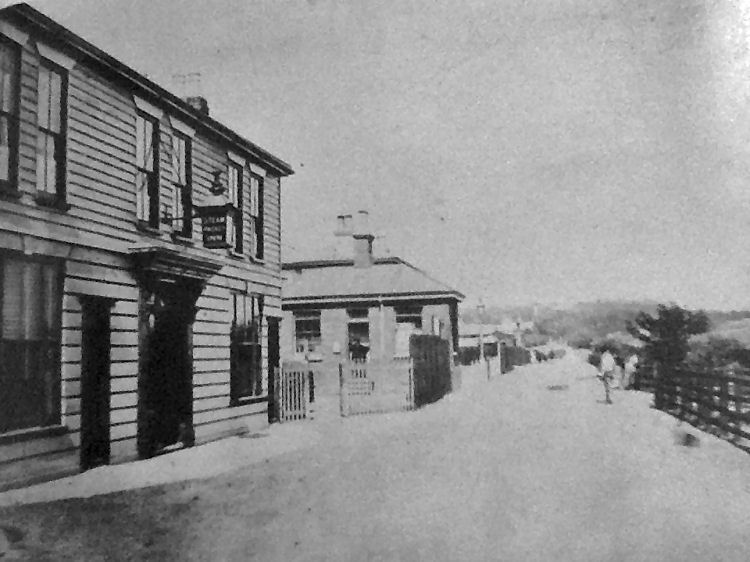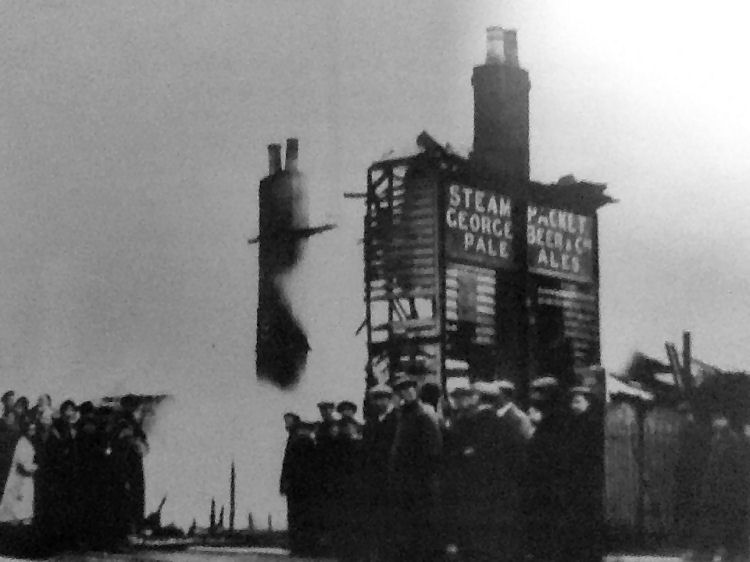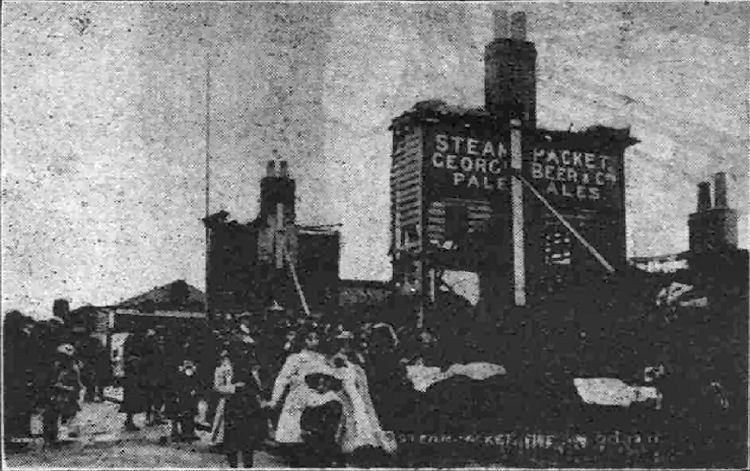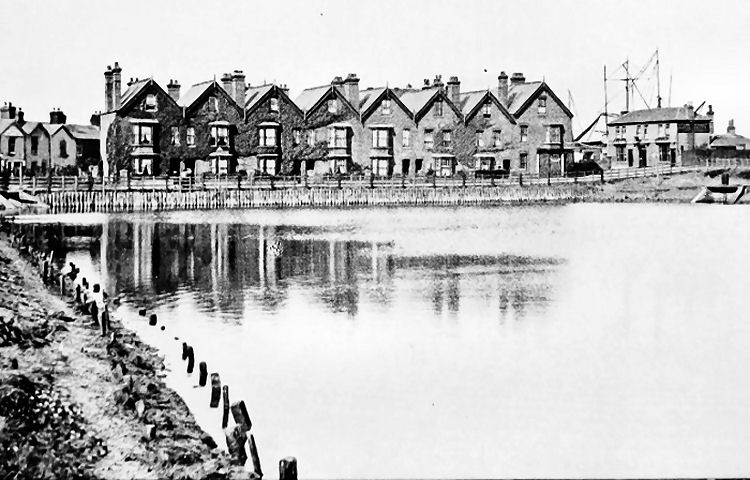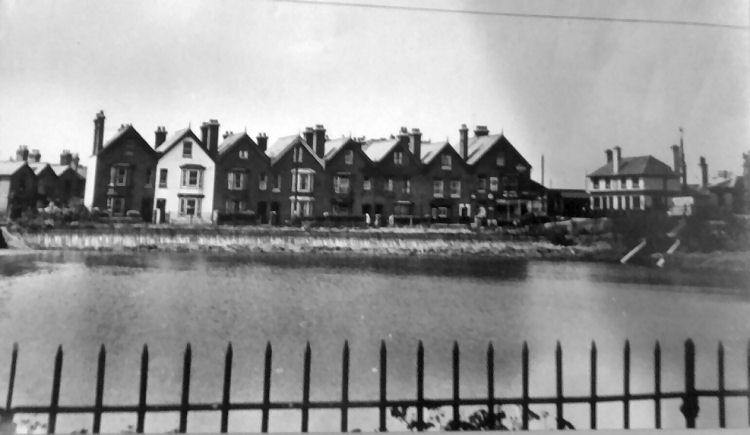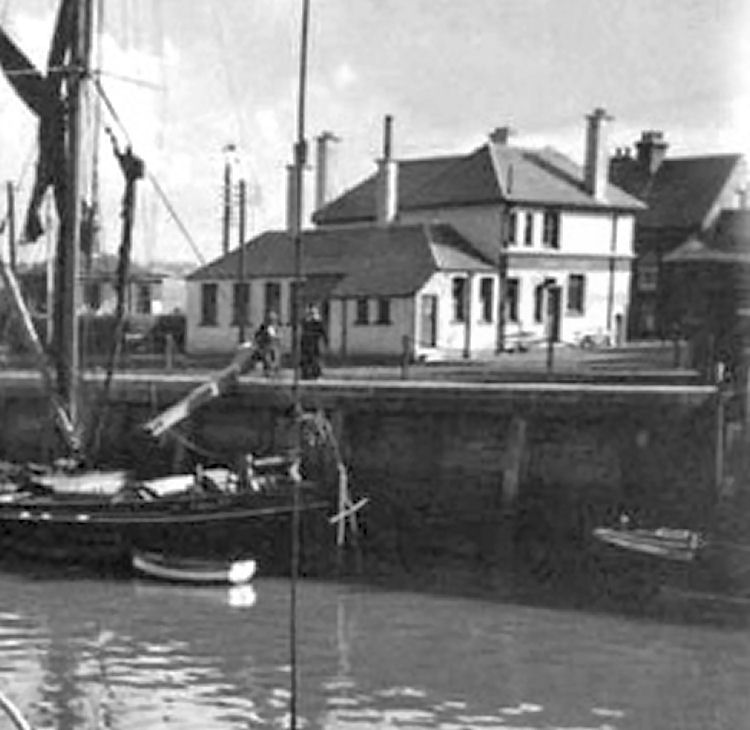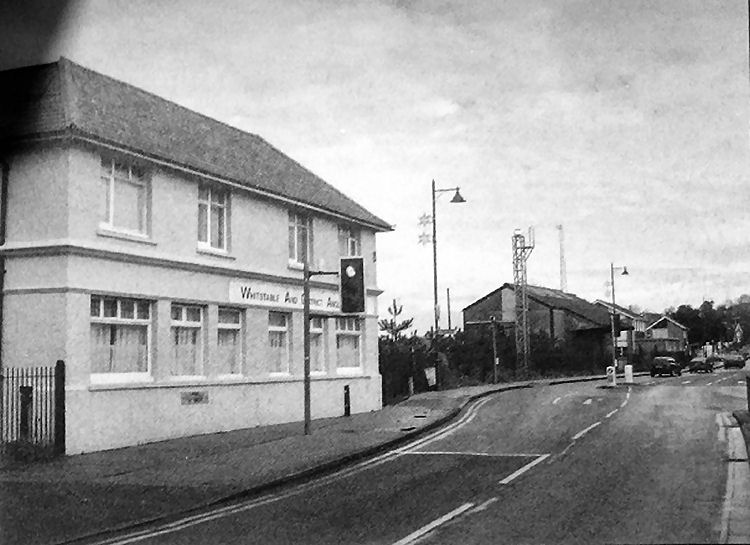|
Whitstable Times and Herne Bay Herald, 25 October, 1913.
THE "STEAM PACKET" PUBLIC HOUSE BURNED DOWN.
AN EARLY MORNING BLAZE.
Efforts of Local Fire Brigade Unavailing.
AFTER THE FIRE.
The highest and most destructive fire that has occurred in Whitstable
for many years broke out early on Sunday morning, the "Steam Packet"
public house in Tankerton Road being raised to the ground. Fortunately
the conflagration was not attended by loss of life, but the tenant. Mr.
L. F. Janes, and his wife, baby, and maid (Ethel Olive) had a very
narrow escape.
Mr. and Mrs. Janes retired to rest at about a quarter past eleven on
Saturday night, leaving everything safe as they believed. At a quarter
past four on Sunday morning Mr. Janes was aroused by the falling of
glass and the cracking of bottles. He at once got up and went downstairs
and found the bar a mass of flames. He promptly shut the bar door and
rushed upstairs and woke his wife and the maid. Mr. and Mrs. Janes'
bedroom was directly above the burning bar. The flames were quickly
gaining a hold of the premises and there was no time for the occupants
to dress properly. They came down quickly, bringing the baby who is only
sixteen months old, and made their escape by way of the side door near
what was the jug and bottle department. It was most fortunate that Mr.
Janes awoke when he did for there was only just time for the occupants
to get away, the flames spreading with such rapidity that a part of the
building collapsed just after they had made their escape. Mr. R. B.
Reeves and family, who reside directly opposite the "Steam Packet"
opened their residence to their unfortunate neighbours and did
everything possible for them. Directly the maid got away from the
burning building she, dressed only in her night attire, ran with all
haste to the police station and called Sergeant Thomas, who promptly
rang up the maroon firer at the fire station. It was about twenty
minutes to five when the maroon was fired. A second maroon was also sent
up. The firemen quickly responded to the call and within eight minutes
after the maroon was fired they had the hose pipes fixed to the hydrants
and water was being played on to the building.
PONY RESCUED FROM STABLE.
Sergeant Thomas, in the meantime, had proceeded to the scene of the fire
and rendered valuable assistance and Mr. Janes gave his attention to
getting out his pony which was stabled just across the yard. It was
with considerable difficulty that the pony was got out. Mr. Janes also
managed to rescue the pony trap, but as it turned out the stable did not
catch alight, which was rather miraculous considering the nearness of it
to the destroyed building. Although the firemen under Captain Ward
worked most energetically their services were of little avail except of
course in confining the outbreak to the one building. A very large
portion of the house being of wood it burned with remarkable quickness
and in about an hour and a half was completely gutted. When the flames
were subdued practically the only parts of the house remaining were a
portion of the rear of the premises which was brick built and what
portions of the two end walls that were of brick. These two pieces of
wall which carried the chimneys on either side were propped up, but
owing to their dangerous character were pulled down on Sunday evening.
A RAGING FURNACE.
Although the day was young the sending up of the maroon brought an
enormous crowd of persons from all parts of the town to the scene of the
fire. "The heat in front of the premises was intense," says an eye
witness, "and it was impossible to pass the house when the flames had
got a complete hold of the structure," while another person informs us
that the flames were so gigantic that the reflection of the fire could
be plainly seen on the side of Mr. Mitchell’s drapery establishment in
High Street, which is, of course, a very considerable distance from the
"Steam Packet." The firemen on arrival, and everyone present praises
them for the promptitude with which they turned out after the firing the
maroon, soon got three branches at work from the two hydrants at Marmion
Road and outside Lawson’s sail loft. Captain Ward and his twelve firemen
had a plentiful supply of water, but the wood construction of the
building and the inflammable nature of its contents, made their task an
almost hopeless one from the start. "Bottles, popped off like guns," says
one person who was present, "and the noise of the raging furnace could
be heard a long distance away."
RAILWAY WAGGONS MOVED TO SAFETY.
Fortunately there was practically no wind or the consequences might
have been much more disastrous. If there had been an easterly wind the
long row of coal stores and other buildings on the harbour would
undoubtedly have caught fire. Several railway trucks at the rear of the
house were moved away for safety because it was feared that sparks might
fall on the tarpaulin coverings and other most inflammable materials.
The heat from the fire was so great that windows of Mr Reeves’ house
opposite were cracked and the paint of the front of the house badly
scorched. A Venetian blind inside one of the rooms was also scorched
notwithstanding that the window in front of it was closed.
Interviewed by our representative at the bar that has been improvised in
the stable at the side of the rains Mr. Janes said he retired for night
at about a quarter past eleven. It was about ten minutes past four on
Sunday morning when he heard a noise downstairs. Thinking someone was
knocking he went down and on going into the bar he was confronted with a
mass of flames. He shut the door and rushed upstairs and woke his wife
and the girl. "With the baby," he said, "we only just managed to get out
in time. It was a narrow squeak and we had to come out in our night
attire. The girl went to the police station to give the alarm and we
went over to Mr. Reeves’ house. Mr. Reeves was very kind to us. The
firemen arrived with their hose cart very soon after the maroon was
fired and worked hard, but within about an hour and a half the place was
down."
MONEY LEFT UNDER PILLOW FOUND IN THE RUINS.
Mr. Janes informed our representative that he took some cash, cheques
and postal orders and put under his pillow on retiring for the night,
but there was no time to take them after he discovered the fire. In the
ruins, however, about £15 in silver, £3 in coppers and a cheque for £2,
which was in the copper bag, were found by the firemen and returned to
him. They also recovered two necktie pins. The finding of the cheque for
£2 was quite a surprise and although burnt it was sufficiently intact to
be presentable.
Mr. Janes was loud in his praise of the way the firemen worked and also
of the kindness shown to him, by Mr. R. B. Reeves and family who so
readily succoured the occupiers of the unfortunate building.
Mr. and Mrs. Janes afterwards went to the "Duke of Cumberland Hotel,"
but are now residing with Mr. Janes’ mother at Bondi, Tankerton.
The contents of the building is valued at £800, Mr. and Mrs. Janes
losing everything with the exception of the money already referred to,
but we understand Mr. Janes was only insured for £650.
There is no definite information available as to the cause of the
outbreak, but it is surmised that it was the result of a faulty stove
and that some soot fell down the back of the above and after smouldering
for some hours ignited the wood work at the rear.
The building was insured for £1,000 in the Phoenix Fire Insurance
Office, while the tenant's property was insured in the Royal Insurance
Office.
THE REMOVAL OF A LAND MARK.
The destruction of the "Steam Packet" removes another of Whitstables old
land marks. The building belongs to the S.E. and C. Railway Company and
Messrs. George Beer and Co., of Canterbury, have a lease of the
premises.
The "Steam Packet" has an interesting history, dating back to early in
the nineteenth century. The site of the present harbour was formerly the
property of the Commissioners of Sewers and was a part of the shore. The
harbour as it is now known was made after the Whitstable—Canterbury
railway, which, as our readers are aware, was the second line in England
opened to public traffic, came into being. The south quay was made first
and steam boats from London, which were run by a local company for a few
years, landed at the stairs, which were situated at the end of the high
shore - where the eastern quay was afterwards erected. From the calling
of the steam boats at the stairs the inn nearest to the spot
appropriately became known as the "Steam Packet." Ben Harnett was the
tenant in those early days and the front of the inn was facing the sea.
The back of the premises was the wall that was seen standing after
Sunday's fire. The wooden front of the house as known to the present
generation was evidently the site of the back yard in those days. As the
business at the harbour increased so the business of the public-house
increased and with the advancement of the town (although very slow at
that time) a new front was put to the house (this was about forty-seven
years ago), only the front was made to face Tankerton Road. When the S.
E. Railway Company purchased the branch railway line to Canterbury they
also re-constructed the harbour and built the two quays. It was just
after this that the "Steam Packet" premises were altered. The history of
the Whitstable and Canterbury railway and the old "Steam Packet" can,
therefore, be said to be contemporaneous.
Mr. Janes took the house from Mr. Reman about two years ago. The
greatest sympathy is felt for him in his loss, for he had proved himself
a very popular licensed victualler and is highly respected by a large
circle of friends and customers.
INTERVIEW WITH MR. B. B. REEVES.
Mr. R. B. Reeves. who is the secretary of the local gas company and
resides at Douglas House, directly opposite the "Steam Packet," said, in
reply to our representative's enquiries, that it was about ten minutes
past four on Sunday morning when he heard someone knocking at the door
of his house. On being aroused he saw a tremendous blaze across the
road, the doors of the "Steam Packet," then being well alight. He went
downstairs and let in Mrs. Janes, who was carrying her baby, and the
maid, who had just returned from giving the alarm at the police station.
Mrs. Reeves being away at time he called his daughters, who came down
and provided Mrs. Janes and the maid with clothes. Mr. Janes after
getting the pony out, went across to Douglas House and Mr. Reeves got
some clothes for him. In a few moments, said Mr. Reeves, the flames came
through the windows of the "Steam Packet," first on the west side and
then on the east side. For more than twenty minutes there was scarcely a
person about, added Mr. Reeves, but when the maroon was fired crowds of
people soon arrived. The maroon was fired just under half past four and
well under ten minutes the firemen were at work on the building. When
they arrived there was a big body flame and the firemen could do little
but, said Mr. Reeves, they managed to dull the flames at the west end
and thus prevent the fire from reaching the coal sheds belonging to
Messrs. Gann and Brown and others. It was fortunate there was very
little wind, added our informant.
"The heat was tremendous," he said, "and I could not stand at my front
door without holding a handkerchief to my face. The plate glass window
of my house cracked like a miniature pistol going off and the Venetian
blinds behind the glass were blistered with the heat." The roof of the
"Steam Packet" collapsed in parts, explained Mr. Reeves. There was a
tremendous flame from the burning building, he said.
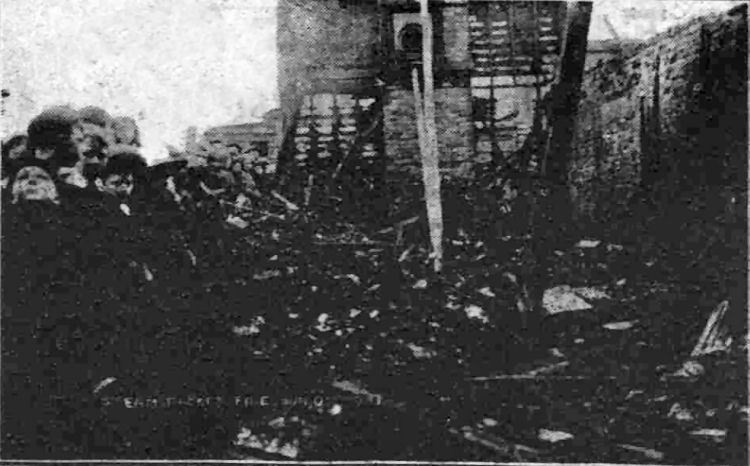
Above photo, among the ruins.
|
